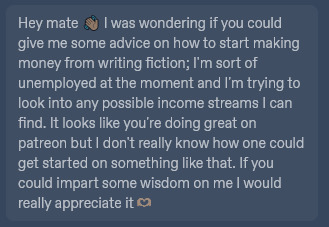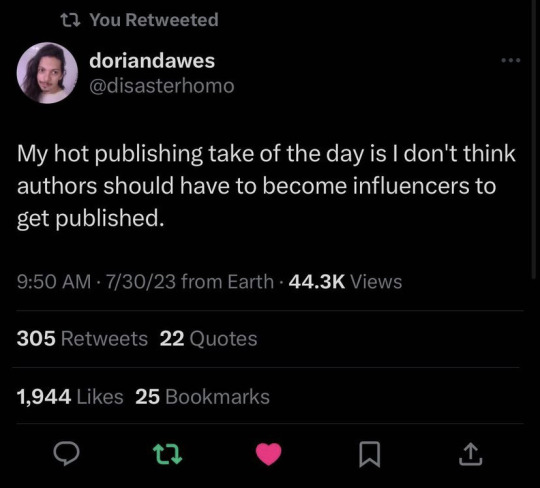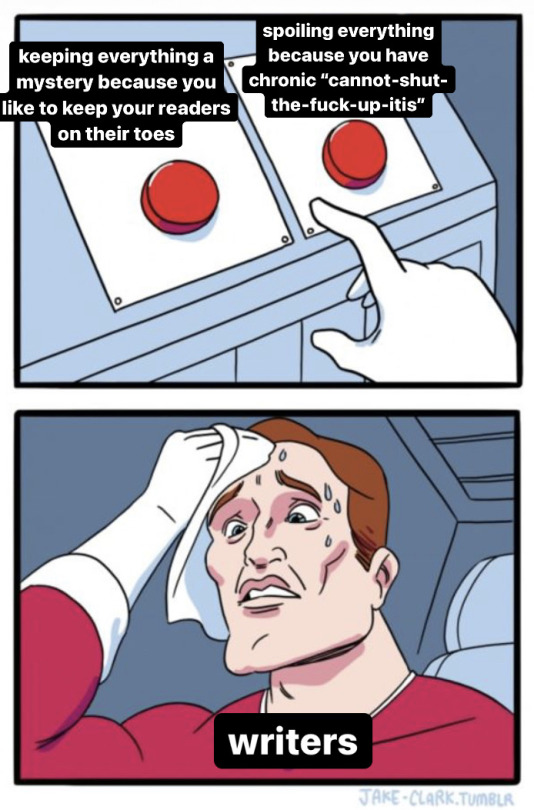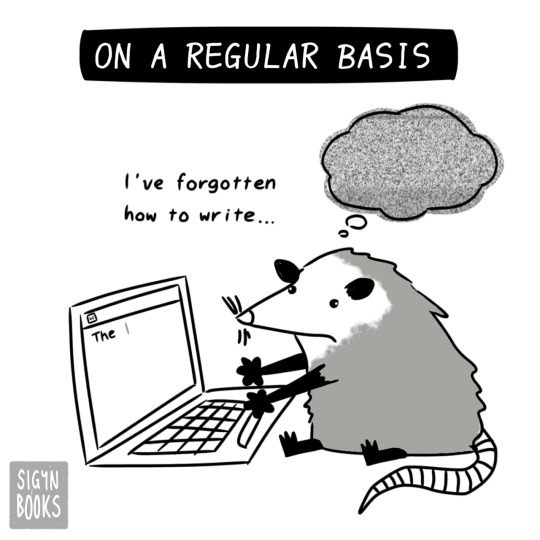Hiya, I'm Ezra and I'm trying to carve out a space on here that's more focused on my work as a writer! Here, you'll find reblogs related to writing, links to new published short stories and posts on my website, and sometimes original art. http://ezravogel.com/
Last active 2 hours ago
Don't wanna be here? Send us removal request.
Text
How can I make money writing fiction?

I'm gonna be straight with you. There is no guarantee that you'll make enough as an independent writer to make it worth your time. You very well might -- I make a liveable wage as an independent writer -- but many don't. Most writers I know also have a job. And luck plays a big part in it.
If you're interested in going forward in spite of this, you have two main options for monetisation open to you, and you are going to have to pick one. I call them the sales model and the sponsorship model, and you are going to have to pick one.
The sales model involves writing stories and selling them to readers. You can put books up on Amazon or Smashwords, sell them direct from your own website, enlist the help of a traditional publisher to handle that for you and let them decide where to sell, whatever -- the point is that your money is made from the sale of books to readers. If you go with a traditional publisher, you're using this model (though they will give you some of the money ahead of time in the form of an advance). Most indie authors also use this model, publishing through draft2digital, Ingram Spark, direct through Amazon, whatever. I've never relied on the sales model and can't give you any advice on how to do this, but Tumblr is full of indie authors who probably can.
The sponsorship model involves soliciting small amounts of money from various readers over time. This is ideal for web serials, and it's what I use. I use Patreon, which is designed specifically for this purpose, but you can use other sites such as ko-fi. This model involves providing regular content for free, with bonuses for those who support you.
"Can't I do both? Sell books and have a Patreon?" You absolutely can! I know several indie authors with a Patreon. I sell my completed books as ebooks and will eventually sell them as paperbacks. But your time and attention is limited, and so is your audience's, and you're going to have to half-arse one of these in order to have enough arse to whole-arse the other. You're going to make a lo of decisions that benefit either the sponsorship model or the sales model, not both. So pick your primary income source early and commit.
I can only advise on writing web serials and using the sponsorship model, so I'll go ahead with that assumption. If you want to make a liveable wage doing this, not only will you need luck, you'll also need patience. This is not a fast way to build a career. at the end of my first year of doing this, I had one single patron, and they were a real-life friend of mine. When I reached an income of $100/month, I threw a little party for myself, I was so happy. It had taken such a long time and was so much work. I reached enough to cover rent/mortgage after I'd been doing this for more than four years. It's a long term sort of career.
Here are some general tips for succeeding in this industry, given by me, someone with no formal training in any of this who only vaguely knows what they're talking about:
Have a consistent update schedule and STICK TO IT
The #1 indicator for stable success in this industry (aside from luck, which we're discounting because you can't do much about that) is having a consistent update schedule. Your readers need to know when the next chapter is coming out, and it should be coming out regularly. Ideally, you should have no breaks or hiatuses -- if you're in a bus crash or something, that might be unavoidable, and your readers will understand if you tell them, but if you're stopping and starting a lot for trivial reasons, they WILL abandon you. You can't get away with that shit if you're not Andrew Hussie, and I'm pretty sure Andrew Hussie doesn't message me for career advice on Tumblr. If you find you need a lot of hiatuses to write fast enough then you're updating too often; change your schedule. A regular schedule is more important than a fast one (ideally it should be both, but if you have to pick between the two, pick regular).
2. Pay attention to your readership, listen to what they want from you
Your income is based on a pretty complicated support structure when you're using the sponsorship model. this model relies on people finding your story, liking your story, and continuing to find it valuable enough to keep paying you month after month. This means that your rewards for your sponsors should be things that they value and will continue to pay for ('knowing I'm supporting an artist whose work I enjoy' counts as a thing that they value, to my great surprise; there's a lot of people giving me money just for the sake of giving me money, so I can pay my mortgage and keep writing for them without needing a second job), but it also means supporting the entire network that attracts readers and keeps them having the best time they can with your story -- being part of a rewarding community. Because this is advice on making money, I'm going to roughly divide your readership into groups based on how they affect your bottom line:
sponsors. People giving you money directly. The importance of keeping this group happy should be obvious.
administration and community helpers -- discord moderators, IT people, guys who set up fan wikis, whoever's handling your mailing list if you have a mailing list. You can do this stuff yourself, or you can hire someone to do it, but if you're incredibly lucky and people enjoy being a part of your reader community, people will sometimes volunteer to do the work for free. If you are lucky enough to get such people, respect them. They are doing you a massive favour, and they're not doing it for you, but to maintain a place that they value, and you have to respect both of those things. My discord has just shy of 1,300 members and is moderated by volunteers. I'd peel my own face off if I had to moderate a community that large. If you've got people stepping up to do work for you, you need to respect them and you need to make sure that they continue to find that rewarding by doing what you can to make sure that the community they're maintaining is rewarding. Sometimes this means taking actions and sometimes this means staying the fuck out of the way. Depending on the circumstances.
fan artists. Once you have people drawing your characters, writing fanfic of your stories, whatever, treat these like fucking gold. Give them a space to do this, and more importantly, give them a space to do this without you in it. Fanworks are a symptom of engagement with your work, which is massively important. They are also a component of a healthy community, an avenue for readers to talk to each other and express themselves creatively to each other. Third, fanworks act as a bridge for new readers. When readers share their art on, say, Tumblr, it can intrigue new people and get them into the story. Your job in all of this is to give them the space to work, encourage them as required or invited (I reblog most TTOU fanart that I'm tagged in on Tumblr, for instance), and other than that, stay the fuck out of their way. These people are vital to the liveblood of your community, the continued engagement of your audience, and the interest of your sponsors. Some of the fan artists will be sponsors themselves; some won't be. Those who aren't sponsors are still massively valuable for their art.
speculators, conversers, theorists, livebloggers, and That Guy Who's Just Really Jazzed For The Next Chapter. Some people don't make art but just like to chat about your story. These people are a bedrock of the community that's supporting your sponsors and increasing your readership, and therefore are critical to your income stream. Give them a place to talk. Be nice to them when they talk to you. Sometimes, they'll ask you questions about the story, which you can choose to answer or not, however you feel is appropriate. They'll also want to chat about non-story-related stuff with each other, so make sure they have a place to do that, too.
that guy who never talks to you or comments on anything but linked your story to ten guys in his office who all read it now. Some of your supporters are completely invisible to you. You can't do anything for these people except continue to release the story and have a forum they can silently lurk on if they want to. But, y'know, they exist.
If you want to focus on income then these are, roughly, the groups of people that you will need to listen to and accommodate for. You can generally just make sure they have space to do their thing, and if they want anything else, they'll tell you (yes, guys, paperbacks will be coming eventually). Many people will fit into multiple groups -- I have some sponsors that are in every single one of these groups except the last. Some will only be in one group. A healthy income rests on a healthy community which rests on accommodating these needs.
3. If you can manage it, try to make your story good.
It's also helpful for your story to be good. Economically, this is far less important than you'd think -- there are some people out there writing utter garbage and making a living doing it. Garbage by what standards? By whatever your standards are. Just think of the absolute laziest, emptiest, hackiest waste-of-bandwidth story you can imagine -- some guy is half-arsing that exact story and making three times what you'll ever make on Patreon doing it. And honestly? Good for him. If he's making that much then his readers are enjoying it, and that's what matters. Still, one critical component of making money as a writer is writing something that people actually want to read. And you can't trick them with web serials, because they don't pay in advance -- if they're bored, they'll just stop. So you have to make it worth their time, money and attention, and the simplest way to do that is to write a good story.
This hardly seems mentioning, since you were presumably planning to do that anyway. It's basic respect for your audience to give them something worth their time. Besides, if we're not interested in improving our craft and striving for our best, what are we even writing for? I'm sure I don't need to tell you to try to write a good story. The reason I list this is in fact the opposite -- don't let "I'm not a good enough writer" paralyse you. The world is full of someday-writers who endlessly fuss over and revise a single story because it's not good enough, it's not perfect, they're not Terry Pratchett yet. Neither was Terry Pratchett when his first books were published. If you're waiting to be good enough, you won't start. I didn't think Curse Words was good enough when I started releasing it -- I still don't. I started putting it out because I knew it was the only way I'd get myself to actually finish something. I don't think it's all that great, but you know what? An awful lot of people read it and really enjoyed it. And if I hadn't released it, I'd have been doing those people a disservice.
Also, it taught me a lot, and based on what I learned, Time to Orbit: Unknown is much better. If I'd never released Curse Words, if I hadn't seen how people read it and reacted to it and seen what worked and what didn't, then Time to Orbit: Unknown wouldn't be very good. And it certainly wouldn't be making me a living wage, because it was the years writing Curse Words that started building the momentum I have today.
And Time to Orbit: Unknown as it is today has some serious problems. Problems that I'm learning from. And the next book will be a lot better.
So that's basically my advice for making money in this industry. Be patient, be lucky, be consistent. Value your community; it's your lifeline, even the parts of it that don't directly pay you. And try to make your story as good as you can, but make that an activity you do, not a barrier to prevent you from starting.
Good luck.
732 notes
·
View notes
Text
Writing advice from my uni teachers:
If your dialog feels flat, rewrite the scene pretending the characters cannot at any cost say exactly what they mean. No one says “I’m mad” but they can say it in 100 other ways.
Wrote a chapter but you dislike it? Rewrite it again from memory. That way you’re only remembering the main parts and can fill in extra details. My teacher who was a playwright literally writes every single script twice because of this.
Don’t overuse metaphors, or they lose their potency. Limit yourself.
Before you write your novel, write a page of anything from your characters POV so you can get their voice right. Do this for every main character introduced.
231K notes
·
View notes
Text
Pro-writing tip: if your story doesn't need a number, don't put a fucking number in it.
Nothing, I mean nothing, activates reader pedantry like a number.
I have seen it a thousand times in writing workshops. People just can't resist nitpicking a number. For example, "This scifi story takes place 200 years in the future and they have faster than light travel because it's plot convenient," will immediately drag every armchair scientist out of the woodwork to say why there's no way that technology would exist in only 200 years.
Dates, ages, math, spans of time, I don't know what it is but the second a specific number shows up, your reader is thinking, and they're thinking critically but it's about whether that information is correct. They are now doing the math and have gone off drawing conclusions and getting distracted from your story or worse, putting it down entirely because umm, that sword could not have existed in that Medieval year, or this character couldn't be this old because it means they were an infant when this other story event happened that they're supposed to know about, or these two events now overlap in the timeline, or... etc etc etc.
Unless you are 1000% certain that a specific number is adding to your narrative, and you know rock-solid, backwards and forwards that the information attached to that number is correct and consistent throughout the entire story, do yourself a favor, and don't bring that evil down upon your head.
83K notes
·
View notes
Text
This might be unpopular but I’m not going to use simpler vocabulary in my writing if it’s out of character for the narrator. If my POV character is a botanist, he’s going to call a plant by its name. If you don’t know what it is you can either Google it or move on just knowing it’s a plant of some sort.
I don’t like this trend of readers being angry that not everything is 100% understandable for them. I want my characters to be believable as people and sometimes people use words people outside of their field will not understand. That’s not a bad thing.
You don’t have to understand every word to get the gist of what’s happening. I’m not going to slow down an action scene to describe every weapon because someone might not know them by name. They can just assume it’s a weapon because that makes sense in the context of the scene.
50K notes
·
View notes
Text
Me: *agonizing over whether a semicolon goes here, what the proper dialogue should be there, other assorted rules and semantics*
Terry Pratchett: "!" said the stranger.
THAT'S ALLOWED?
18K notes
·
View notes
Text
not enough fantasy settings talk about street food like c'mon there was street food in ancient times across basically every culture lemme see what weird snacks you can buy off a guy in an alleyway
58K notes
·
View notes
Text
Writing pro tip: If you can't figure out how a section of your story is supposed to go, just include a frame narrative about how you're actually translating a Medieval manuscript and write a translator's note explaining that that section of the manuscript was damaged
4K notes
·
View notes
Text
BREAKING NEWS: Writer discovers for the millionth time that they can write whatever they want. Join us now to see if the lesson will stick.
63K notes
·
View notes
Text
Expanding a thought from a conversation this morning:
In general, I think "Is X out-of-character?" is not a terribly useful question for a writer. It shuts down possibility, and interesting directions you could take a character.
A better question, I believe, is "What would it take for Character to do X?" What extremity would she find herself in, where X starts to look like a good idea? What loyalties or fears leave him with X as his only option? THAT'S where a potentially interesting story lies.
In practice, I find that you can often justify much more from a character than you initially dreamed you could: some of my best stories come from "What might drive Character to do [thing he would never do]?" As long as you make it clear to the reader what the hell pushed your character to this point, you've got the seed of a compelling story on your hands.
54K notes
·
View notes
Text
been reading a lot of middle grade novels (to help me write this middle grade novel) and my god the absolute craft some of these writers can squeeze into 40k words
34 notes
·
View notes
Text
this is a PSA for fic writers who haven't updated in a while :
there are fics out there I'm subscribed to that have gone double digit months without updating.
rest assured the moment those babies catapult an AO3 email my way i'm dropping from the face of the earth to sink my teeth into them
i'll wait, and so will your readers
31K notes
·
View notes
Note
What are your thoughts on authors writing and posting fanfiction of their own work? Do you think being self published vs traditionally published makes a difference? I tried searching around about the topic before but found nothing conclusive, other than the statement, "if you're the owner of the work, you might as well make more money off of it," which doesn't sit right with me.
I mean, I'm quite (in)famously writing an AU fic of my own work (Sugar Vladdy) purely for fun and because Tumblr has a unique ability to pilot my lack of impulse control like the ADHD version of Ratatouille.
Numerous people have told me they'd buy Sugar Vladdy if I ever decided to make it into a proper book. Frankly, I'm not interested in that because my motives for writing Hunger Pangs vs. Sugar Vladdy were different.
Writing for profit vs writing for fandom occupy different spaces in my brain. They scratch different itches. Yes, I'm playing around with the same characters. But I'm sort of just treating it like enrichment in my enclosure. It lets my brain throw around all the ideas that wouldn't work for those characters within the canon universe but still likes to go, "Oh, but what if..."
Honestly. No idea how much of that is my ADHD or what, but that's the only way I can explain it. They're the same, but they're not. They're fun in different ways. And I can get away with it because I'm self-pub. I haven't sold the rights to anyone. The world and characters are mine. I can put my blorbos into situations if I want to.
Now, if I were trad-pub, there would probably be a lot of restrictions about what I can and cannot do surrounding my own characters because I've sold the rights for X amount of time. I couldn't just give things away. It might be considered a breach of contract if I did. It'd definitely be something I'd need to run by an agent first just to make sure.
As for not liking the "might as well make money off it" mindset, as a literal struggling writer who lives paycheck to paycheck, I'm not going to judge anyone who keeps their official work as for profit only. People deserve to be paid for their labor. If they/we want to create stuff away for free, that's up to us.
Would I personally find it stifling and joy-killing to only ever write for profit? Yes. But that's a me thing. Not a universal thing.
317 notes
·
View notes
Text

The cord is a unit of measure of dry volume used to measure firewood and pulpwood in the United States and Canada. A cord is the amount of wood that, when "racked and well stowed", occupies a volume of 128 cubic feet.
Wikipedia
thought you should know
16 notes
·
View notes
Text
That post that's like "stop writing characters who talk like they're trying to get a good grade in therapy" really blew the door wide open for me about how common it's become for a character's emotional intelligence to not be taken into consideration when writing conflict. I remember the first time I went to therapy I had such a hard time even identifying what I was feeling, let alone had the language to explain it to someone else. Of course there are plenty of people who've never been to therapy a day in their life who are in tune to their emotions. But even they would have some trouble expressing themselves sometimes. You have to take into account there are plenty of people who are uncomfortable expressing themselves and people who think they're not allowed to feel certain ways. It also makes for more interesting conflict to have characters with different levels of understanding.
103K notes
·
View notes


